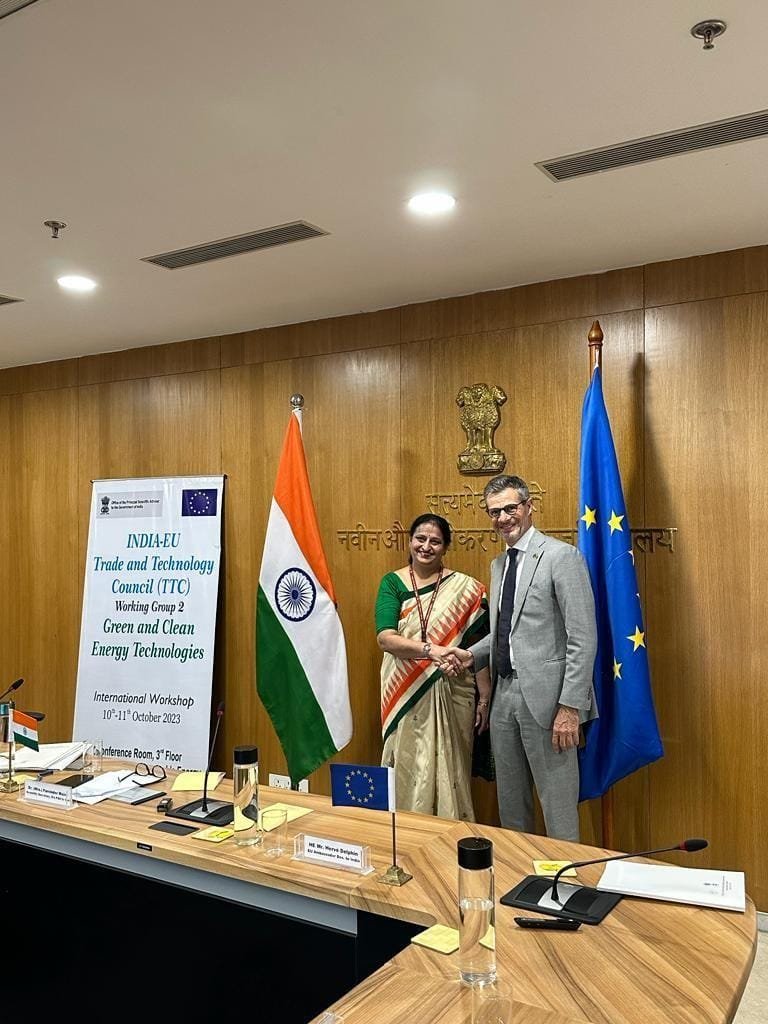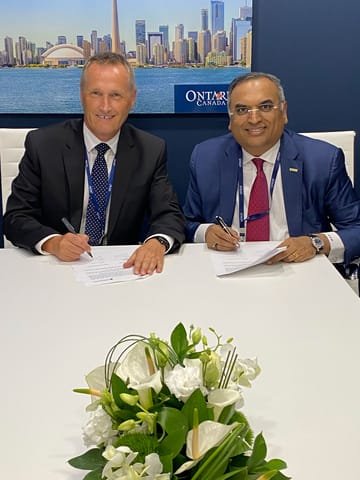Lemaître calls for accelerating growth of green-clean energy technologies
E-vehicles is a key solution and paves the way to achieve future targets sets for climate management, according to Marc Lemaître, Director-General, Directorate General for ‘Research and innovation’, European Commission, Brussels.
He highlighted e-vehicles in his emphasis on the importance of India-EU collaboration towards a shared vision for a sustainable future.
Lemaître highlighted the pivotal role of research and regulation in accelerating the growth of green and clean energy technologies through video conferencing to the India-European Union (EU) Trade & Technology Council (TTC) Working Group 2 (WG2).
The 2-day international workshop on “Green & Clean Energy Technologies”, held 10-11 Oct 2023, was organized by the Office of Principal Scientific Adviser to the Government of India and hosted by the Ministry of New and Renewable Energy (MNRE) in hybrid mode.
The workshop comprised of four insightful sessions:
The first session ‘Waste to Green Hydrogen’ was chaired by Dr. Arun Tripathi, (Advisor, MNRE, India) and co-chaired by Helene Chraye (Head of Unit, DG R&I Directorate C1 – Unit on Clean Energy Transition, EU). The session witnessed multiple presentations on possible ways of collaboration between India and EU on Hydrogen Storage, transportation, Safety Standards, and regulatory framework. Technologies, solutions, and opportunities to convert Waste into Green Hydrogen were discussed.
The second session ‘Marine Plastic litter and Wastewater’ was chaired by Szilvia Nemeth (Deputy Head of Unit, Directorate B4 on Healthy Oceans and Seas, EU) and co-chaired by M.V. Ramana Murthy (Mission Director, Deep Ocean Mission, Ministry of Earth Sciences, India). Topics discussed included marine plastic pollution mitigation and wastewater treatment strategies to combat the ocean plastic crisis and urban water challenges.
The third session was divided into two sub-sessions. Session 3(a) on ‘E-mobility: Circulatory Aspects of Batteries’ was chaired by Sudhendu Jyoti Sinha (Adviser, Infrastructure, Connectivity & E-mobility, NITI Aayog) and co-chaired by Philippe Froissard (DG R&I – Head of Unit, Directorate C2 on Future Urban & Mobility Systems). Insights into battery circulatory considerations and the potential of the EV & battery recycling sector were presented.
Session 3(b) on ‘Interoperability of Charging Infrastructure’ chaired by Ashok Rajput, (Member (Power System), Central Electricity Authority (CEA)) and co-chaired by Harald Scholz, (Head of Mobility Lab in JRC-ISPRA) discussed the possibilities of co-development of charging infrastructure technologies between India and EU. Further, the session explored the collaboration between Automotive Research Association of India (ARAI) and Joint Research Center (JRC), EU in applicability of standards, testing methodology, and optimization.
The fourth session ‘Standards’ was chaired by Kirsi Haavisto (DG R&I – Head of Unit in Directorate C1 on Valorisation policies & IPR) and co-chaired by Pramod Kr. Tiwari (DG- Bureau of Indian Standards (BIS)). The session witnessed intense discussions on the importance of harnessing data and scientific insights to form standards and initiate R&I and standards early in new technology research phases. A potential Code of Practice on Standardisation was also discussed.
Speaking at the workshop, Hervé Delphin, Ambassador-designate of the EU to India, underscored the vital need for ongoing dialogue & technological cooperation between India & the EU.
Dr. Parvinder Maini (Scientific Secretary, Office of Principal Scientific Adviser to Government of India) shared key takeaways on Sessions I and III, which included R&D on Lithium-ion batteries and recycling technologies, formalization of uniform waste collection system, and development of a business model for complete value chain.
Cristina Russo (Director, Global Approach & International Cooperation in R&I, EU) shared key takeaways on Sessions II and IV. She stressed on the need for a harmonized method to address plastic litter. As next steps, she proposed developing standards for specific technologies under each of the thematic topics. Fiinews.com








